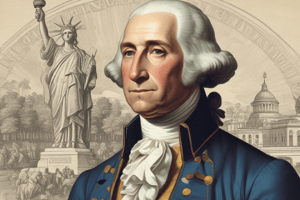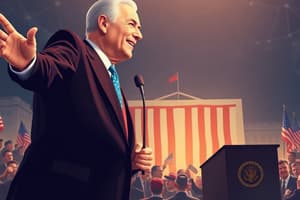Podcast
Questions and Answers
What was Thomas Jefferson and Alexander Hamilton's main disagreement in George Washington's Cabinet?
What was Thomas Jefferson and Alexander Hamilton's main disagreement in George Washington's Cabinet?
- The interpretation of the Constitution and the extent of federal power (correct)
- The economic policies and the role of the national bank
- The handling of foreign affairs and relations with European powers
- The approach to westward expansion and dealing with Native American tribes
How did George Washington deal with the Native Americans and Little Turtle?
How did George Washington deal with the Native Americans and Little Turtle?
- He negotiated treaties and sought peaceful coexistence with Native American tribes
- He encouraged westward expansion, leading to conflicts with Native American tribes
- He sent military forces to suppress Native American resistance in the Northwest Territory (correct)
- He appointed Native American representatives to his Cabinet to address their concerns
How did America establish the court system during George Washington's Presidency?
How did America establish the court system during George Washington's Presidency?
- By creating a Supreme Court with limited jurisdiction over state laws
- By appointing state governors as federal judges to oversee legal matters
- Through an executive order empowering local judges to handle federal cases
- Through the Judiciary Act of 1789, which organized the federal court system (correct)
What was Washington's Declaration of Neutrality in response to?
What was Washington's Declaration of Neutrality in response to?
Flashcards are hidden until you start studying
Study Notes
Jefferson and Hamilton's Disagreement
- Jefferson and Hamilton disagreed on the role of the federal government in the economy.
- Jefferson believed in a limited federal government, favoring states' rights and an agrarian economy.
- Hamilton advocated for a strong central government, promoting industry and national economic growth.
- Their clash centered on issues like the national bank, tariffs, and funding the national debt.
Washington and Native Americans
- Washington faced challenges in dealing with Native American tribes who resisted American expansion.
- The Northwest Indian War saw confrontations between American forces and tribes like the Miami Confederacy led by Little Turtle.
- Little Turtle was a skilled strategist and defeated American forces at several battles, including Harmar's Defeat and St. Clair's Defeat.
- The war ended with the Treaty of Greenville in 1795, where tribes ceded vast lands to the U.S.
Establishing the Court System
- The Judiciary Act of 1789 established the federal court system.
- It created the Supreme Court, comprised of a Chief Justice and five associate justices.
- The Act also established lower federal courts, including district courts and circuit courts.
- This laid the foundation for the independent judicial branch of the United States government.
Washington's Neutrality Declaration
- The French Revolution created tension between the U.S. and Great Britain, who were at war.
- France sought American support, while Britain pressured the U.S. to remain neutral.
- Washington, recognizing the fledgling nation's need for stability and to avoid entangling alliances, issued the Proclamation of Neutrality in 1793.
- This declaration reaffirmed the U.S.'s commitment to neutrality and established a precedent for American foreign policy.
Studying That Suits You
Use AI to generate personalized quizzes and flashcards to suit your learning preferences.




